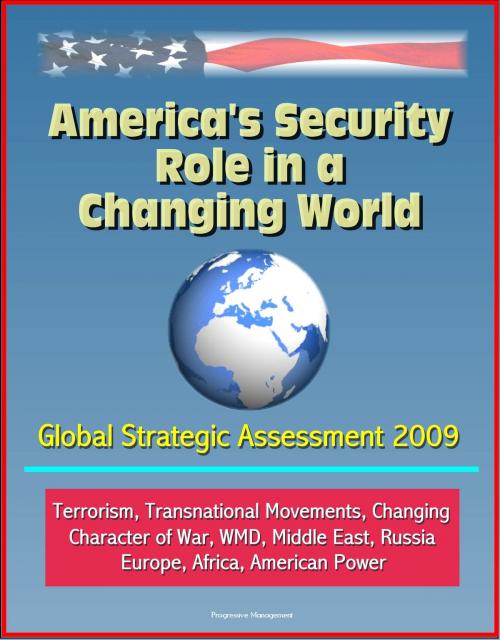America's Security Role in a Changing World: Global Strategic Assessment 2009: Terrorism, Transnational Movements, Changing Character of War, WMD, Middle East, Russia, Europe, Africa, American Power
Nonfiction, History, Military, United States, Social & Cultural Studies, Political Science| Author: | Progressive Management | ISBN: | 9781311050144 |
| Publisher: | Progressive Management | Publication: | February 21, 2016 |
| Imprint: | Smashwords Edition | Language: | English |
| Author: | Progressive Management |
| ISBN: | 9781311050144 |
| Publisher: | Progressive Management |
| Publication: | February 21, 2016 |
| Imprint: | Smashwords Edition |
| Language: | English |
Professionally converted for accurate flowing-text e-book format reproduction, this Global Strategic Assessment offers a conceptual pathway for U.S. policymakers to begin recalibrating America's security role to reverse what has appeared to be a widening gap between U.S. ends and means, now and in the future. International security requires U.S. active engagement, but the character of that engagement is changing along with the global environment. Worldwide trends suggest that the United States will increasingly have to approach complex challenges and surprises through wider and more effective partnerships and more integrated strategies. This volume explains the complex security environment and how in particular the United States can begin the process of strategic adaptation. Complexity is the watchword of our century. This assessment should be a healthy reminder of just how complex—and dangerous—a world we live in. That complexity was encapsulated by the Greek poet Archilochus, who said that the fox knows many things but the hedgehog had only one big idea. During the previous administration, the United States conflated security under the umbrella of a "global war on terror" and focused on a single big idea. Thus, in this volume a central idea, if not an organizing principle, is that the United States will have to be as clever as the fox, keeping its eye on multiple challenges and taking care not to exert its finite resources on any single problem. Preparing for and dealing with such profound complexity requires particular capabilities, approaches, and proclivities: cultural, developmental, experiential, technical, organizational, political, and operational. These attributes can be selected, cultivated, and enhanced, and it seems that they will have to be if we are to survive, let alone succeed.
America's Security Role in a Changing World * Chapter 1: The Global Redistribution of Economic Power * Chapter 2: Political Flux in a Nonpolar World * Chapter 3: The Impact of the Information Revolution * Chapter 4: Energy and Environmental Insecurity * Chapter 5: Fragile States and Ungoverned Spaces * Chapter 6: Transnational Movements and Terrorism * Chapter 7: The Changing Character of War * Chapter 8: The Proliferation of Weapons of Mass Destruction * Chapter 9: The Greater Middle East * Chapter 10: South Asia * Chapter 11: Russia/Eurasia * Chapter 12: East and Southeast Asia * Chapter 13: Europe * Chapter 14: Africa * Chapter 15: The Americas * Chapter 16: America's Contributions to Global Security * Chapter 17: Alternative Force Structures and Resource Constraints * Chapter 18: National Security Reform and the Security Environment * Chapter 19: Cooperation with Allies and Coalition Partners * Chapter 20: Competitive Strategies for U.S. Engagement
Professionally converted for accurate flowing-text e-book format reproduction, this Global Strategic Assessment offers a conceptual pathway for U.S. policymakers to begin recalibrating America's security role to reverse what has appeared to be a widening gap between U.S. ends and means, now and in the future. International security requires U.S. active engagement, but the character of that engagement is changing along with the global environment. Worldwide trends suggest that the United States will increasingly have to approach complex challenges and surprises through wider and more effective partnerships and more integrated strategies. This volume explains the complex security environment and how in particular the United States can begin the process of strategic adaptation. Complexity is the watchword of our century. This assessment should be a healthy reminder of just how complex—and dangerous—a world we live in. That complexity was encapsulated by the Greek poet Archilochus, who said that the fox knows many things but the hedgehog had only one big idea. During the previous administration, the United States conflated security under the umbrella of a "global war on terror" and focused on a single big idea. Thus, in this volume a central idea, if not an organizing principle, is that the United States will have to be as clever as the fox, keeping its eye on multiple challenges and taking care not to exert its finite resources on any single problem. Preparing for and dealing with such profound complexity requires particular capabilities, approaches, and proclivities: cultural, developmental, experiential, technical, organizational, political, and operational. These attributes can be selected, cultivated, and enhanced, and it seems that they will have to be if we are to survive, let alone succeed.
America's Security Role in a Changing World * Chapter 1: The Global Redistribution of Economic Power * Chapter 2: Political Flux in a Nonpolar World * Chapter 3: The Impact of the Information Revolution * Chapter 4: Energy and Environmental Insecurity * Chapter 5: Fragile States and Ungoverned Spaces * Chapter 6: Transnational Movements and Terrorism * Chapter 7: The Changing Character of War * Chapter 8: The Proliferation of Weapons of Mass Destruction * Chapter 9: The Greater Middle East * Chapter 10: South Asia * Chapter 11: Russia/Eurasia * Chapter 12: East and Southeast Asia * Chapter 13: Europe * Chapter 14: Africa * Chapter 15: The Americas * Chapter 16: America's Contributions to Global Security * Chapter 17: Alternative Force Structures and Resource Constraints * Chapter 18: National Security Reform and the Security Environment * Chapter 19: Cooperation with Allies and Coalition Partners * Chapter 20: Competitive Strategies for U.S. Engagement















